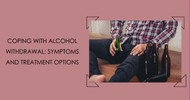Coping With Alcohol Withdrawal: Symptoms and Treatment Options
Posted by Daniella Park on 4th Jun 2024
Are you struggling to break free from the bondage of alcoholism? Well, you’re not alone. According to findings by the National Survey on Drug Use and Health (NSDUH), over 10% of Americans aged 12 years or older are battling alcohol use disorder (AUD).
Sadly, a significant percentage of the affected population continues to waste away alcoholism. Those who’re bold enough to give up the bottle also contend with withdrawal symptoms.
Fortunately, it’s possible to brave alcohol withdrawal symptoms and emerge victorious on your journey to full sobriety. This article will explore the various ways to cope with alcohol withdrawal and the treatment options available for the associated symptoms.
What Is Alcohol Withdrawal?

Alcohol erodes the functionality of various regions of the brain, particularly areas that control the body’s natural reward systems. The net effects are addiction and dependency.
When the body becomes addicted to alcohol intake, it’s difficult to perform the simplest tasks without downing a bottle or two. And the more you get hooked to the drink, the harder it is to operate without it.
Fortunately, many alcoholics have reached a turning point in their lives and resolved to quit drinking. It’s a monumental sacrifice, as the journey towards an alcohol-free life is fraught with untold struggles.
Withdrawal symptoms are the most common challenges experienced by recovering alcoholics. The term denotes a host of adverse effects that occur when a person cuts back their regular dosage of an addictive drug or quits the substance altogether.
Alcohol withdrawal can manifest in various ways. Below are the most commonly reported symptoms;
- Gastrointestinal complications, such as nausea, vomiting, diarrhea, and abdominal discomfort
- Behavioral symptoms, such as agitation and irritability
- Mood disorders like stress, anxiety, and nervousness
- Cardiovascular symptoms like elevated heart rate
- Whole body symptoms, including fatigue, chills, sweating, inappetence, and unexplained weight loss
Some recovering addicts may also experience persistent headaches and disorientation. Depending on the level of addiction, you may observe trembling that ranges from mild tremors to outright seizures.
Coping Mechanisms and Treatment Options for Alcohol Withdrawal
Alcohol withdrawal symptoms can be unbearable while they last. However, you could explore several treatment options to mitigate the severity of the symptoms and even prevent them from occurring.
Below are some of those interventions;
1. Staying Active
Most alcohol withdrawal symptoms thrive in idleness. If all you do is snuggle on the couch, processing all manner of wild thoughts, you’re bound to entertain negative alcohol cues.
That’s part of the reason experts recommend pursuing an active lifestyle.
However, it’s the activities you engage in that truly count.
Avoid networks and places that trigger alcohol cues. Instead, join self-improvement action groups.
You might also consider purchasing a gym membership.
Exercise stimulates the release of endorphins, feel-good chemicals known for their antidepressant effects. It also encourages healthy blood circulation, which might help alleviate withdrawal aches.

2. Embracing AA’s 12-Step Program
Alcoholics Anonymous (AA) is a global fellowship of former and recovering addicts. The organization advocates for complete abstinence from alcohol by providing a platform through which former addicts can share their success stories on how they overcame the monster of alcoholism.
Alcoholics-Anonymous fosters sobriety through several mechanisms, one of which is its 12-step program.
AA’s 12-step program is designed to help recovering alcoholics acknowledge their past failures and embrace acceptance on their new journey to sobriety. The steps include;
- Acknowledging the adverse health effects of alcohol use.
- Believing you can tap into a higher power to overcome alcoholism.
- Undertaking to pull all the stops to ease the recovery process.
- Identifying your strengths and leveraging them to aid recovery.
- Acknowledging your past mistakes but refusing to be imprisoned by the inner guilt.
- Embracing the positive and helpful people you’ll meet on the road to recovery.
- Summoning your higher power for help to navigate the challenges ahead.
- Acknowledging the people you’ve wronged and planning to make amends.
- Connecting with the people you’ve hurt and asking for forgiveness
- Continue admitting your past mistakes to eliminate any lingering denial.
- Seeking out help through prayer and social interactions.
- Repeating all the above steps as long as it takes.
3. Investing in AA Recovery Coins
Earning recovery coins is another AA-based alcohol withdrawal coping mechanism.
AA coins are special chips or medallions issued to former addicts to help them celebrate certain milestones in their sobriety journey. The chips are available in different colors, depending on the period the recipient has been sober.
White recovery giftssymbolize the beginning of your recovery journey. Such coins speak to your solemn commitment to quit alcohol.
Silver AA chipsrepresent 24 hours of sobriety, while gold chips are earned after being alcohol-free for 60 days. The coins continue until the twelfth month of sobriety, which is typically marked by bronze medallions.
All recovery chips received after the first year of sobriety are also bronze-colored.
Sobriety medallions stand out as a stark reminder of your past failures while pointing you to a promising future. When alcohol withdrawal symptoms become so overwhelming that you think of giving up, glancing at these badges of honor can provide the motivation you need to forge ahead.

4. Upgrading Your Diet
It’s difficult to achieve alcohol detox without implementing a robust diet change.
First, switch to foods that are high in natural antidepressants.
Many plant-based products, including ginger and chamomile, possess serotonin-boosting abilities. Ramping up your intake of such foods can help combat mental liquor withdrawal symptoms like stress and anxiety.
Some foods may also stimulate melatonin production. Integrating such products into your bedtime routine might help you combat insomnia, a major alcohol withdrawal symptom.
If you’re suffering from inappetence, you might invest in appetite-stimulating supplements like energy drinks.
5. Enlisting For Therapy
Supplementing the above interventions with counseling can accelerate your recovery process.
Professional counseling services are necessary even if everything appears to be going according to plan. Your therapist will share insightful knowledge on how to achieve speedy alcohol detoxification.
It’s even better if the therapist was an addict themselves, as they can share the challenges they experienced while hooked to alcohol and how they surmounted those obstacles.
Many alcohol counseling sessions involve conducting drug screening. These tests are necessary to understand the amount of alcohol still in your system, so you can better combat the withdrawal symptoms.

Final Word
Managing alcohol withdrawal symptoms is a monumental challenge for many recovering addicts. It’s worse for those who do not understand the treatment options to explore. Hopefully, you’ll implement the tips highlighted in this post to wean off the effects of alcohol from your system without risking a relapse.


